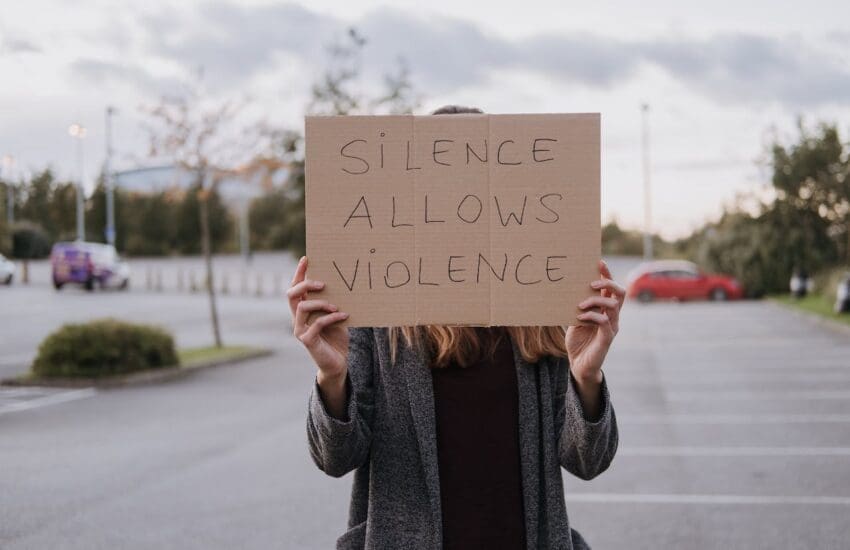Introduction: The prevalence of domestic abuse and the need for support
Domestic abuse is a dark and harrowing reality that affects countless individuals around the world. Behind closed doors, lives are shattered, souls are wounded, and hearts cry out for help. In these moments of despair, it becomes crucial for us to step forward as guiding lights in the lives of those trapped in abusive relationships.
Whether you’re a concerned friend or family member, or even someone who has experienced abuse firsthand, your support can make all the difference. By understanding the dynamics of an abusive relationship and recognizing the signs, we can offer a ray of hope amidst the darkness.
As part of this blog post, we will explore how to effectively provide emotional support and practical resources to someone in an abusive relationship, as well as how to encourage them to seek professional support.
Together, let’s become beacons of light in their journey towards safety and healing. Let’s bring about positive change one life at a time!
Understanding the dynamics of an abusive relationship
A person who may be experiencing an abusive relationship needs to understand the dynamics of the relationship if they are to be effectively supported. Power imbalances in abusive relationships are characterized by various forms of abuse – physical, emotional, psychological, or sexual – where one person exerts control and dominance over the other.
In these relationships, the abuser often manipulates and undermines their partner’s self-esteem and confidence. They use tactics such as gaslighting, making them question their own reality and perception of events. The victim may feel trapped and isolated due to fear or threats from their abuser.
It’s important to recognize that abuse is not always physical; emotional and psychological abuse can be just as damaging. The effects of this type of abuse can extend beyond the relationship itself, with long-lasting impacts on mental health and overall well-being.
Additionally, abusive relationships tend to follow a cycle of violence: tension building phase, explosive incident (the actual occurrence of abuse), followed by reconciliation or honeymoon phase where the abuser may show remorse or temporarily change their behavior before repeating the cycle again.
By understanding these dynamics, we can better empathize with those experiencing abuse. It helps us comprehend why leaving an abusive relationship is not always easy for victims due to complex emotions like fear for personal safety or financial dependence on their perpetrator.
Signs that someone may be in an abusive relationship
In order to help a friend or loved one, it is important to recognize the signs of an abusive relationship. While every situation is unique, there are some common indicators that can raise concerns.
1. A sign of physical abuse could be bruises, cuts, or other injuries that they make excuses for or try to conceal.
2. Isolation from friends and family: If you notice your loved one becoming increasingly isolated and cutting ties with their support network, it could be a red flag.
3. Constant criticism and humiliation: Emotional abuse often involves constant put-downs, name-calling, or belittling comments that chip away at the person’s self-esteem.
4. Control over finances and daily activities: An abuser might exert control by limiting access to money, monitoring their partner’s movements constantly, or making all decisions without input.
5. Fearful behavior: Pay attention if your friend seems anxious around their partner or always walks on eggshells out of fear of setting them off.
It is important to keep in mind that these signs are not definitive proof of abuse but rather warning signs worth taking seriously. Trust your instincts and approach the situation delicately – offering support while respecting their autonomy is crucial.
How to approach and support a friend or loved one in an abusive relationship
When a loved one may be in an abusive relationship, it’s vital to approach the issue with compassion and consideration. Timing and location are key factors, so ensure that your conversation takes place in a private and comfortable environment where they feel at ease sharing.
Begin by expressing care for their safety without placing fault or criticism on them. Remind them that you are available to assist them regardless of their choices. Reiterate that they do not have to navigate this alone and emphasize that abuse is never tolerable.
You should listen actively to your clients’ feelings and validate them. If they feel comfortable sharing their thoughts, fears, or doubts, encourage them to do so. Do not offer advice unless they specifically ask you for it.
Encourage them to share their experiences. Locate resources that specialize in domestic violence, including hotlines, support groups, and counseling services. Offer to accompany them when seeking professional assistance or researching online safety planning options.
Maintain ongoing communication and check-ins with your loved one regularly without pressuring them into making any immediate decisions. Remind them of their worthiness of love and respect outside of the abusive relationship.
Remember that supporting someone in an abusive relationship can take a toll on your own emotional well-being too. Reach out to friends, family members, or seek guidance from professionals like therapists or life coaches who specialize in relationships.
By being patient, compassionate, and non-judgmental towards your friend or loved one trapped in an abusive relationship, you can become a guiding light during these dark times while empowering them to make choices best suited for their safety and well-being
Providing emotional support and resources for safety planning
Providing emotional support and resources for safety planning is crucial when helping someone in an abusive relationship. It’s important to approach the situation with empathy, understanding, and a non-judgmental attitude.
First and foremost, let your loved one know that you are there for them. Create a safe space where they feel comfortable opening up about their experiences. Listen actively and validate their feelings without placing blame or judgment on them.
Empower your friend or family member by providing information on local resources available to victims of abuse. This can include helplines, support groups, counseling services, and even emergency shelters if necessary. Make sure they have access to these resources and understand how to use them.
Encourage the individual to create a safety plan tailored to their specific circumstances. This may involve identifying safe places they can go during an abusive episode, memorizing important phone numbers (including yours), documenting evidence of abuse, and having an emergency bag packed with essential items ready at all times.
Remind your loved one that they deserve happiness and freedom from abuse. Encourage self-care activities such as therapy sessions or engaging in hobbies that bring joy into their life. Offer ongoing emotional support throughout their journey towards leaving the abusive relationship.
Remember that supporting someone in an abusive relationship can be emotionally draining for you as well. Take care of yourself by seeking support from friends, family members or even professional counselors who specialize in assisting individuals dealing with domestic violence situations.
By providing emotional support along with practical resources for safety planning, you can help guide your friend or loved one towards finding hope amidst darkness – empowering them to make choices that will lead them towards a brighter future free from abuse.
Encouraging and assisting with seeking professional help
Supporting someone in an abusive relationship to seek professional help is a vital factor in ensuring their safety and wellness. It’s essential to approach this dialogue with empathy, comprehending and without criticism. Communicate that they have a support system in this process.
Remind them that reaching out for help is not a sign of weakness or defeat; it takes immense bravery. Encourage open communication about their emotions and encounters, creating a secure environment for them to freely express themselves.
Give information about the various resources available to individuals in abusive relationships, such as hotlines, shelters, counseling services, or support groups. By helping them research these options, they will be able to make informed choices based on their feelings.
Assist your loved one in making appointments or finding qualified professionals who specialize in domestic abuse issues. They may benefit from talking to a therapist who understands the complexities of abusive relationships and can guide them towards healing.
Remember that you cannot force someone to seek help if they are not ready or willing. Offer your continued support regardless of their decision-making process but gently remind them of the importance of prioritizing their own well-being.
Keep reminding your friend or loved one that they deserve love, respect, and safety within their relationship – something no one should ever compromise on.
Letting go of an abusive relationship is never easy but with professional guidance and unwavering support from those around them it becomes possible for survivors to find strength within themselves once again.

Taking care of yourself while supporting someone in an abusive relationship
It is vital to prioritize self-care when supporting a loved one in an abusive relationship. Witnessing someone experience such suffering can be emotionally exhausting and overwhelming, therefore it is important to also take care of your own well-being.
One way to achieve this is by recognizing your own feelings. It is natural to feel emotions such as anger, frustration, or helplessness in this situation. Do not suppress these feelings, but rather process them without judgment. Seeking support from friends, family, or a therapist can be beneficial during this difficult time.
Set boundaries for yourself. Remember that you cannot single-handedly rescue or fix the situation. Recognize that everyone has their own journey and may not be ready or willing to leave the relationship immediately. Be there as a source of support but avoid enabling harmful behavior.
Engage in self-care activities regularly. This could involve practicing mindfulness techniques like meditation or yoga, engaging in hobbies that bring you joy and relaxation, spending time outdoors, or seeking solace in creative outlets such as writing or painting.
Educate yourself about domestic violence and available resources so you can offer informed assistance to your loved one if they decide to seek help. Familiarize yourself with local helplines, shelters, counseling services,and legal avenues they could explore.
Lastly,schedule regular check-ins with trusted friends who understand the situation – people who will listen non-judgmentally and provide emotional support for both you and your loved one.
This way, you have an outlet for processing any stress, fear,and frustration that may arise from supporting someone in an abusive relationship.
Remember,to effectively help others,you must first take care of your own mental health.
That way,you’ll continue being a strong guiding light throughout their journey towards safety,resilience,and healing
Conclusion: The importance of being a guiding light
In times of darkness, one of the most crucial roles we can play is that of a guiding light for those trapped in an abusive relationship. It’s not an easy position to be in, but it’s one that can make all the difference in someone’s life.
By understanding the dynamics and signs of abuse, you can better recognize when someone needs help. Approach them with empathy and compassion, offering non-judgmental support. Remember to prioritize their safety above all else by providing resources for safety planning and encouraging them to seek professional help.
It’s important to acknowledge the emotional toll this journey may take on both you and your loved one. Take care of yourself by setting boundaries and seeking support from others who understand what you’re going through.
Being a guiding light means being there for someone during their darkest moments. By offering unwavering support and encouragement, you have the power to ignite hope within them – hope for a safer future filled with love, respect, and healthy relationships.
In order to break free from an abusive relationship, every small step counts. You can help someone find their way out of the darkness into a life filled with happiness and freedom by being there for them as a caring friend or family member.
Let us, together, shine brighter than ever as beacons of hope – empowering survivors and standing up to domestic abuse until its destructive shadow does not ruin any more lives.
Be that guiding light today!


